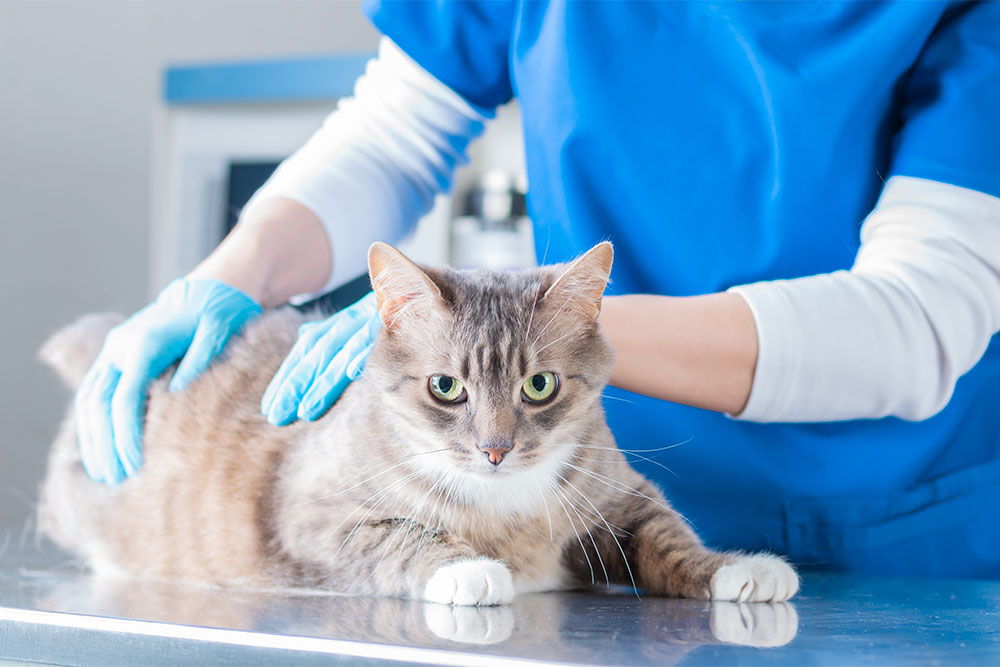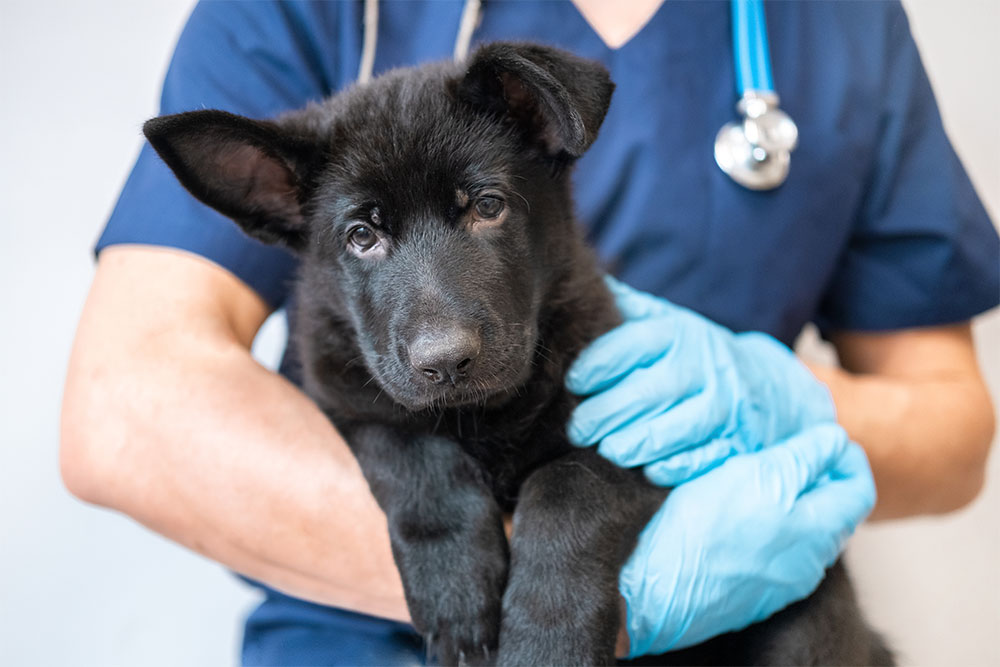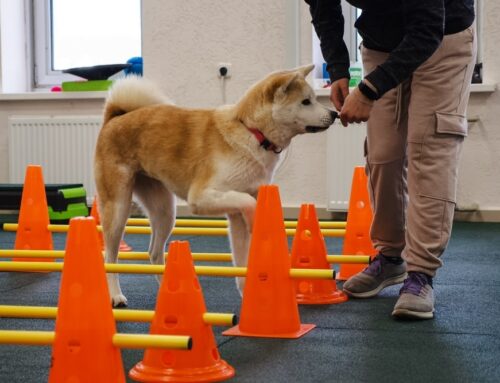Accidents can happen in an instant. A dog slipping out the front door, a fight breaking out at the dog park, a cat falling from a balcony, or a pet landing on a sharp stick during a walk- all of these situations can lead to severe trauma. When these emergencies occur, quick recognition and access to critical veterinary care are often the difference between survival and tragedy.
At Omega Veterinary Group, our team of emergency and specialty veterinarians provide advanced, 24/7 care for pets in the Bay Area. With criticalists leading patient management and the most advanced technology available, we are here when accidents happen and every second matters.
Why Pets Can Look “Fine” Right After an Accident
Immediately after trauma, the body releases adrenaline and cortisol. These stress hormones increase heart rate and blood pressure, dull pain, and sharpen focus. In pets, this surge can temporarily mask internal injuries, concussion, pulmonary bruising, splenic or liver bleeding, diaphragmatic tears, and bladder rupture. A dog or cat may walk, eat, or act close to normal for several hours, then decompensate as hormone levels fall and internal swelling or bleeding progresses.
Do not wait for obvious signs. Even if your pet seems comfortable, a prompt exam and monitoring can catch hidden problems before they turn critical.
What To Do After an Emergency Occurs
The first minutes matter. Keep your pet warm and quiet, limit movement, and place a towel over the body to reduce stress. If walking is unsafe, create a simple stretcher with a blanket or board and lift with two people when possible. Confine cats or small dogs in a carrier to prevent sudden leaps in the car. Protect your hands and face since painful animals may bite or scratch without warning. Do not offer food or water unless instructed, and bring current medications and any recent test results. Call our team from the car so we can triage and prepare for your arrival, and use our 24/7 emergency contact line if you are unsure about any step.
Common Traumatic Injuries in Pets
Severe trauma can occur in many forms. Understanding the most common injuries helps owners act quickly and seek the right care.
Bite Wounds
Scuffles at dog parks or conflicts at home can leave puncture wounds that appear minor but conceal deep tissue damage. Dog bite wounds often lead to infection and abscesses if untreated. Attacks involving large dogs and small pets can also cause broken bones, punctured lungs, or organ injuries in addition to skin wounds.
Broken Bones
Falls, car accidents, or blunt force impacts can cause fractures. Broken bones in dogs range from simple cracks to complex breaks requiring surgical repair. Cats are especially prone to pelvic and limb fractures after high falls.
Thoracic Trauma and Respiratory Injuries
Impact injuries to the chest, known as thoracic trauma, can damage ribs, lungs, and surrounding structures. Hemothorax occurs from bleeding in the chest cavity that restricts lung expansion Lung contusions occur from bruising of the lungs, which can lead to poor oxygen exchange and worsening respiratory distress. Panting in cats can signal a serious emergency after trauma.
Diaphragmatic Hernias
A tear or defect in the diaphragm from impact injuries can let abdominal organs move into the chest. Pets may show breathing difficulty and require surgery to fix the tear.
Hemoabdomen (Internal Abdominal Bleeding)
Hard impacts can rupture internal organs, leading to blood pooling in the abdomen. Hemoabdomen is life-threatening and may cause collapse or sudden weakness.
Lacerations
Sharp objects such as glass, sticks, or metal can cause deep cuts. Lacerations may bleed heavily, damage underlying tissue, and increase infection risk.
Burns
Fire, hot surfaces, or kitchen accidents can cause serious skin and tissue damage. Burns may look minor initially but worsen as tissue dies, leading to pain and infection.
Electrocution
Chewing on electrical cords or faulty wiring can lead to burns, arrhythmias, and collapse. Learn what to do if your pet is electrocuted before an emergency happens.
How Veterinarians Diagnose Trauma
After a pet arrives at Omega Veterinary Group, our team rapidly stabilizes their condition while using advanced diagnostic tools to uncover hidden injuries.
- Blood work: helps identify anemia, shock, infection, and organ injury.
- X-rays: detect fractures, chest injuries, and hidden internal trauma.
- Ultrasound: reveals fluid buildup in the chest or abdomen, such as hemothorax or hemoabdomen.
Our hospital offers additional specialty diagnostics including CT, endoscopy, and hemodynamic monitoring as part of our comprehensive services.
How Critical Care Saves Lives After Accidents
Critical care is the heart of trauma recovery, and it is where Omega Veterinary Group excels. As a criticalist-owned specialty hospital, every patient benefits from advanced monitoring, intensive support, and the region’s top specialists working together to achieve the best possible outcomes.
Emergency Stabilization
The first step is preventing further decline. Pets in shock may receive IV fluids to restore circulation, oxygen therapy to improve breathing, and warming measures to correct low body temperature. Pain relief is administered quickly to keep pets comfortable and reduce stress on the body.
Advanced Monitoring
Critical care involves continuous observation. Heart rhythm, blood pressure, and oxygen levels are tracked minute by minute. Subtle changes in these values often provide the first clues that complications are developing, allowing intervention before a crisis escalates.
Surgical Intervention and Intensive Support
Some trauma requires immediate surgery, such as repairing internal bleeding or stabilizing broken bones. At Omega, our specialty surgeons perform soft tissue, orthopedic, and neurosurgical procedures supported by advanced anesthesia monitoring and tailored pain management.
Organ Support and Blood Transfusions
When trauma causes blood loss, blood transfusions restore oxygen delivery to tissues. Our hospital is equipped for both blood and plasma transfusions, dialysis, and oxygen therapy to support critical organ function.
Specialized Respiratory Care
For thoracic trauma or severe lung injury, oxygen supplementation may not be enough. Our advanced respiratory care includes high-flow oxygen therapy, ventilator support, and continuous monitoring to keep oxygen levels stable until recovery begins.
Nutritional and Hydration Support
Once stabilized, many trauma patients are too weak to eat or drink. Feeding tubes, IV nutrition, and subcutaneous fluids ensure the body has energy and hydration to heal.
Burn and Wound Management
Critical care also involves aggressive wound and burn treatment. Debridement, sterile bandaging, and pain control limit infection and speed recovery in pets suffering from burns or deep lacerations.
Around-the-Clock Care
Severe trauma patients require continuous monitoring in intensive care units. At Omega, our dedicated canine ICU, feline ICU, and infectious disease unit allow specialized care for every patient’s needs. Our team of emergency clinicians, specialists, and criticalists work collaboratively to ensure no detail is overlooked.
Long-Term Outcomes
Critical care does more than save lives in the moment. It reduces long-term complications, prevents organ damage, and gives pets the best chance of returning to normal function. With integrated specialty services ranging from surgery to neurology, Omega Veterinary Group helps pets achieve the best recovery possible after traumatic injuries.

Trust Omega Veterinary Group When Emergencies Strike
Severe trauma can happen in seconds no matter how well we prepare. The immediate aftermath is frightening, but with the right emergency team, many pets survive and thrive again.
At Omega Veterinary Group, our specialty-trained criticalists, surgeons, and emergency veterinarians deliver life-saving care around the clock. From stabilization to advanced diagnostics, surgery, intensive monitoring, and recovery, we provide every resource your pet needs when it matters most.
If your pet experiences a traumatic injury, do not wait. Call our 24/7 emergency line or come directly to our hospital in San Mateo. In emergencies, every moment counts, and our team is ready to help your pet through the most critical moments of their life.
Omega Veterinary Group
251 N. Amphlett Blvd, San Mateo, CA 94401
Contact us anytime






Leave A Comment